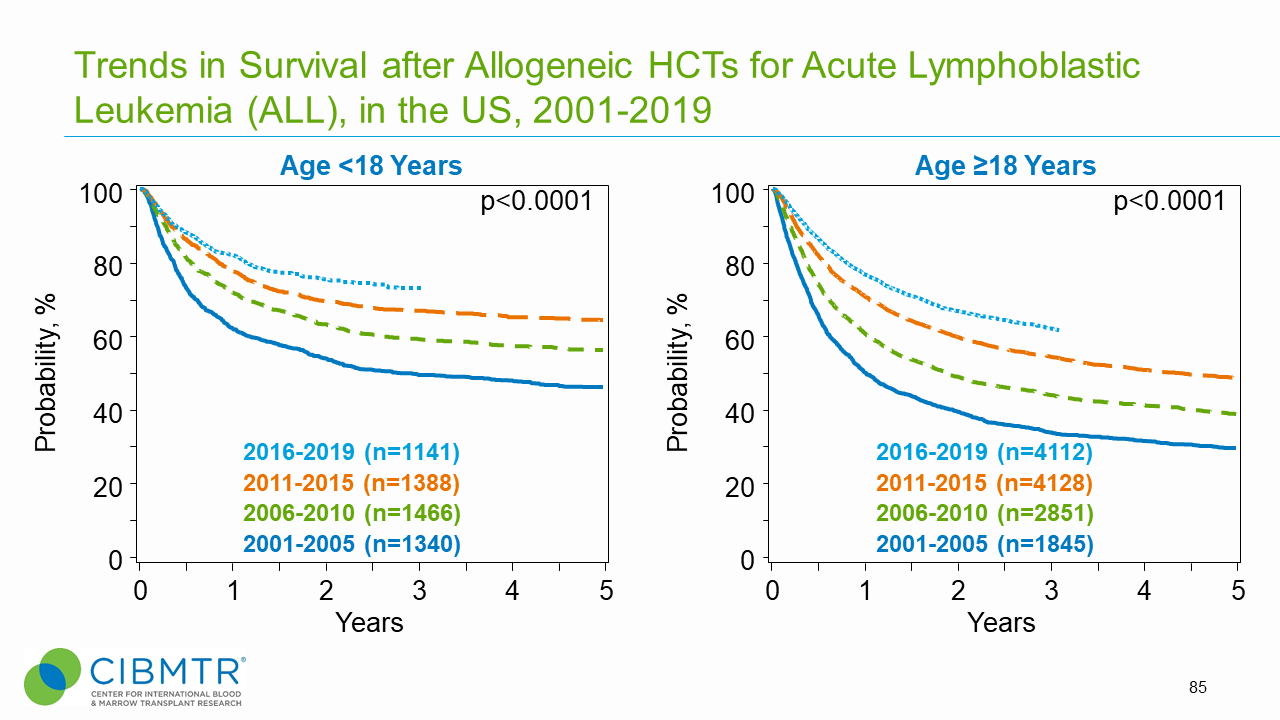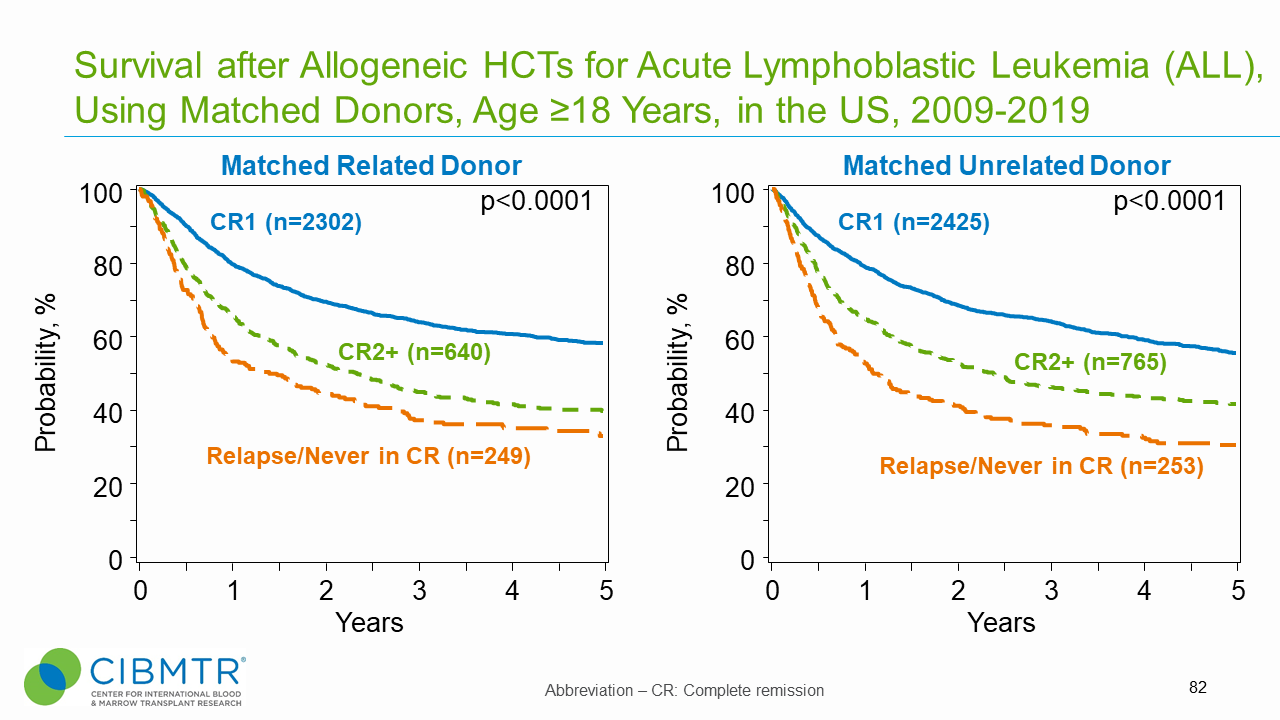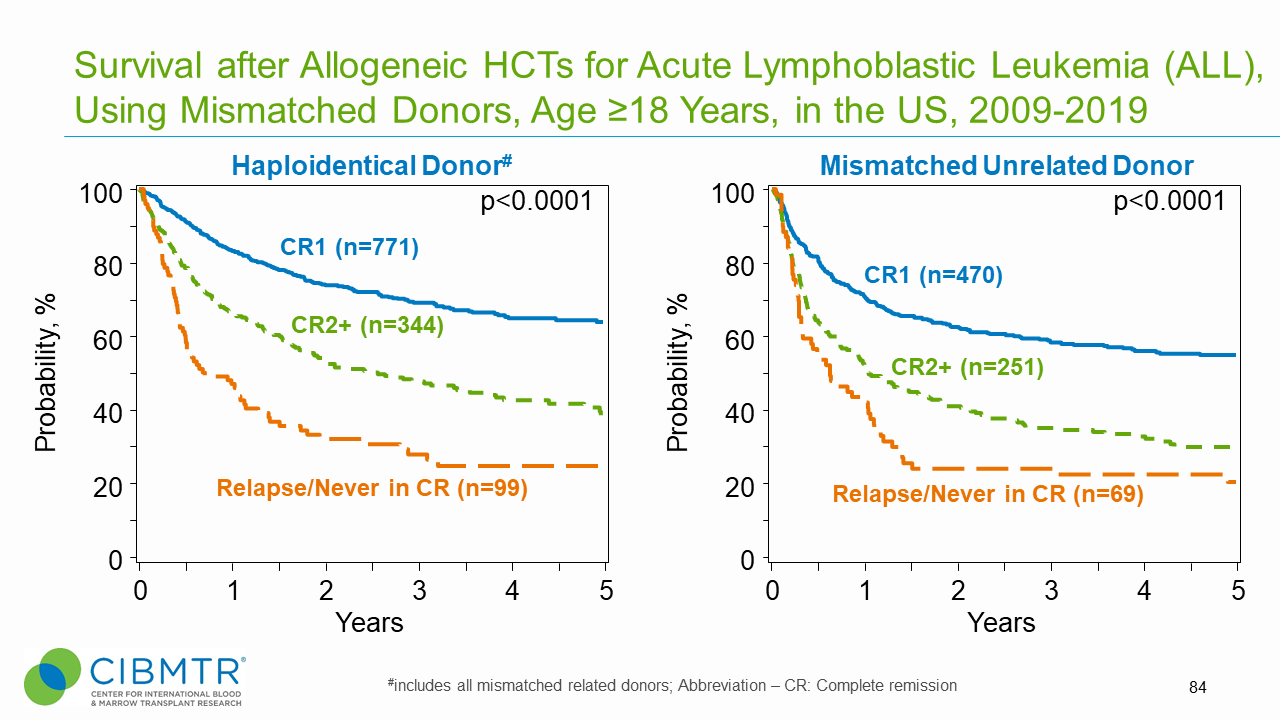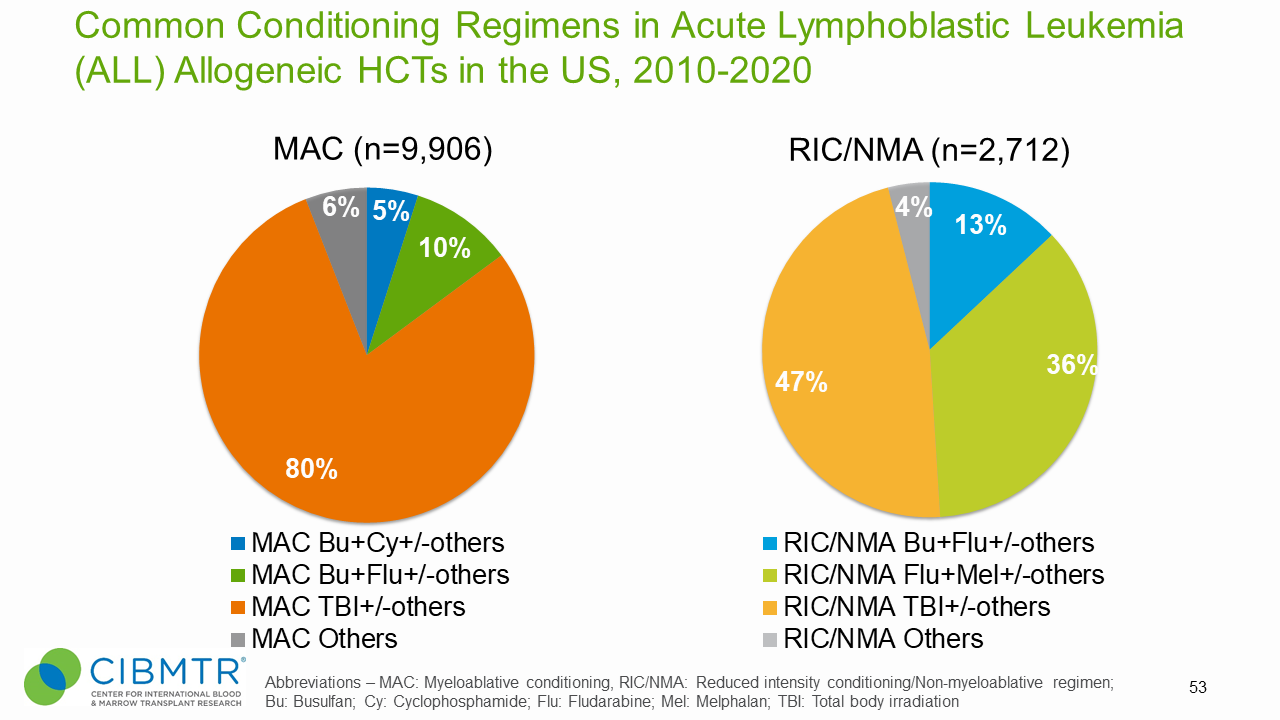Acute Lymphoblastic Leukemia (ALL) - Adult
Approximately 6,250 cases of acute lymphoblastic leukemia (ALL) are diagnosed annually in the United States, representing about 23% of new acute leukemias. [1] Research shows patients transplanted in earlier disease stages have better outcomes than patients with advanced disease. [2,3]
Allogeneic hematopoietic cell transplantation (HCT) is a better treatment option for patients with ALL in first complete remission (CR1) compared to autologous transplantation or chemotherapy. Patients with standard-risk ALL have better survival outcomes than those with high-risk ALL. [4,5]
Outcome
Data in this section have been prepared by the CIBMTR® (Center for International Blood and Marrow Transplant Research®). The CIBMTR is a research collaboration between the National Marrow Donor Program®(NMDP)/Be The Match® and the Medical College of Wisconsin.
Figure 1. ALL Survival Over Time, Adult and Pediatric

Figure 2. ALL Survival, Matched Related and Matched Unrelated HCT

Figure 3. ALL Survival, Haploidentical and Mismatched HCT

Figure 4. ALL Conditioning Regimens for Allogeneic HCT

HCT Consultation Timing Guidelines
The National Marrow Donor Program® (NMDP)/Be The Match® and the American Society for Transplantation and Cellular Therapy (ASTCT) have jointly developed guidelines for transplant consultation and referral timing based on disease characteristics. [6] The National Comprehensive Cancer Network Clinical Practice Guidelines (NCCN Guidelines®) were consulted when developing these guidelines and are a valuable tool in determining risk stratification. [7]
Our guidelines highlight disease categories that include patients at risk for disease progression and who should be referred for a consultation for autologous or allogeneic transplantation. [6]
Transplant Consultation Guidelines: Adult ALL (adult defined as ≥40 years)
High-resolution HLA typing is recommended at diagnosis for all patients
HCT consultation should take place early after initial diagnosis for all patients with AML, including:
- Primary induction failure
- Measurable (also known as minimal) residual disease after initial therapy
- CR1
- First relapse
- CR2 and beyond, if not previously evaluated
View complete HCT Consultation Timing Guidelines
CAR-T Therapy Video for Patients
Chimeric antigen receptor T-cell (CAR-T) therapy is a new effective treatment for hematologic malignancies. Clinical trials of CAR-T therapy targeting the B-cell marker CD19 have shown clear efficacy in multiple hematologic malignancies, specifically ALL. [8]
In this easy-to-understand video, Linda J. Burns, MD, former Vice President, Health Services Research, and Scott Kerwin, RN, MN, CCRC, CCRN, former Clinical Trial Patient Education Specialist at the NMDP/Be The Match, explain what CAR-T therapy is, who it may help, what the treatment is like, potential risks and benefits, questions to ask your doctor and more. View the video and share it with patients and caregivers who are looking for information on CAR-T therapy as a treatment option. and share it with patients and caregivers who are looking for information on CAR- T therapy as a treatment option.
Clinical Trials Search and Support
The NMDP/Be The Match offers the Be The Match® Jason Carter Clinical Trials Search and Support (CTSS) program, which can provide clinical trial navigation to your patients. The CTSS Program was created to help people with blood cancers or blood disorders and their families find and join clinical trials.
For more information, visit Clinical Trials Search and Support.
References
- Siegel RL, Miller KD, Jemal A. Cancer statistics, 2015. CA Cancer J Clin. 2015; 65(1): 5-29. Access
- Lee SJ, Klein J, Haagenson M, et al. High-resolution donor-recipient HLA matching contributes to the success of unrelated donor marrow transplantation. Blood. 2007; 110(13): 4576-4583. Access
- Goldstone AH, Richards SM, Lazarus HM, et al. In adults with standard-risk acute lymphoblastic leukemia, the greatest benefit is achieved from a matched sibling allogeneic transplantation in first complete remission, and an autologous transplantation is less effective than conventional consolidation/maintenance chemotherapy in all patients: Final results of the International ALL Trial (MRC UKALL XII/ECOG E2993). Blood. 2008; 111(4): 1827-1833. Access
- Gupta V, Richards S, Rowe J. Allogeneic, but not autologous, hematopoietic cell transplantation improves survival only among younger adults with acute lymphoblastic leukemia in first remission: an individual patient data meta-analysis. Blood. 2013; 121(2): 339-350. Access
- Ram R, Gafter-Gvili A, Vidal L, et al. Management of adult patients with acute lymphoblastic leukemia in first complete remission: systematic review and meta-analysis. Cancer. 2010; 116(14): 3447-3457. Access
- NMDP/Be The Match and ASTCT Recommended Timing for Transplant Consultation. Download (PDF)
- National Comprehensive Cancer Network. Acute Lymphoblastic Anemia. (Version 1.2022). Access
- Brudno JN, Kochenderfer JN. Recent advances in car T-cell toxicity: Mechanisms, manifestations and management. Blood Reviews. 2019;34:45-55. Access